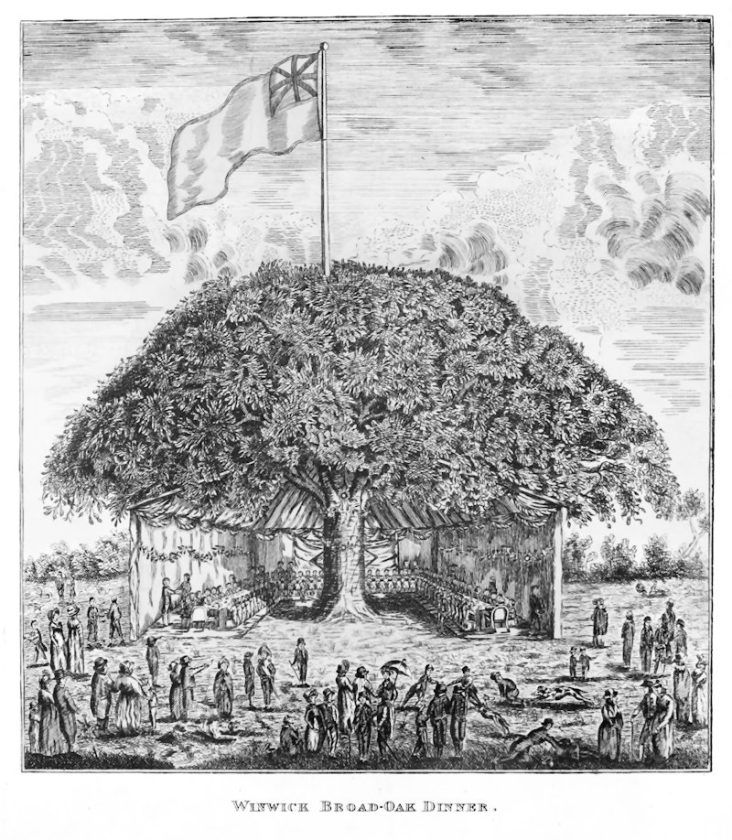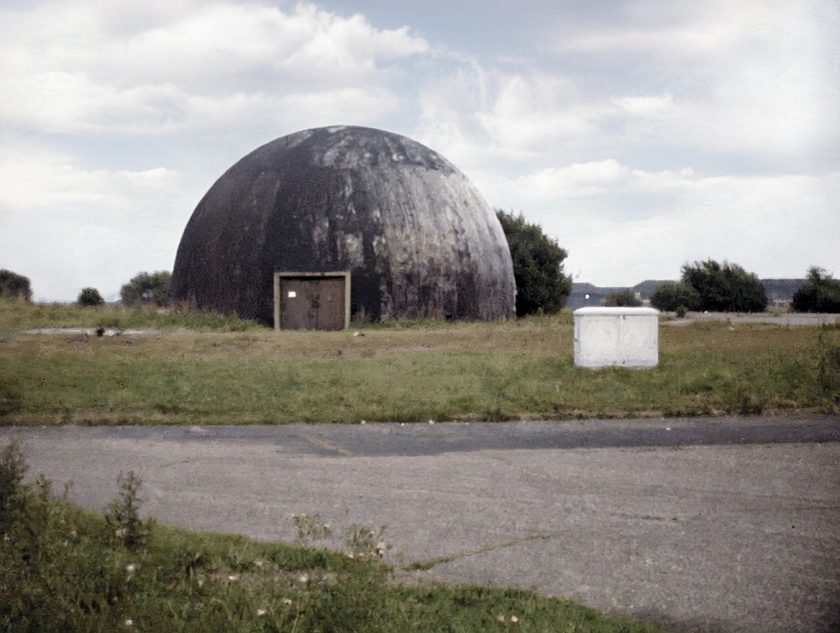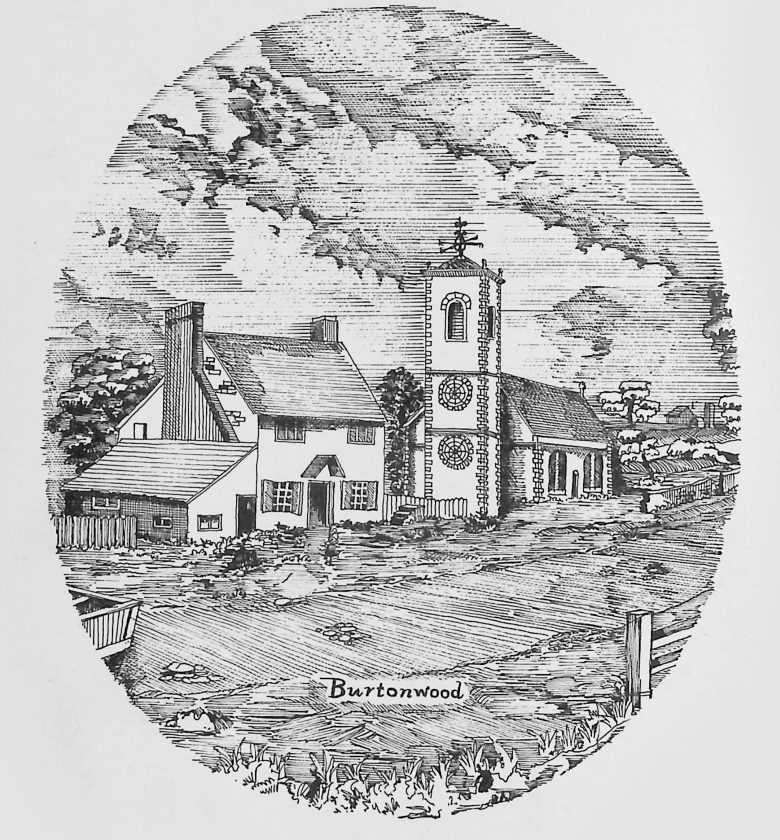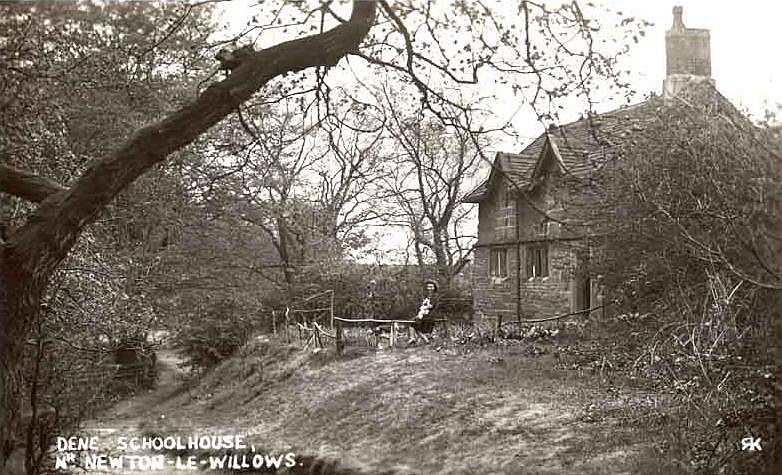The above illustration, which is reproduced from an old print kindly lent to us by Miss Calvert of Warrington, represents a memorable event in the history of the quaint village of Winwick, which occurred on August 26, 1811. Beneath the branches of the giant tree—the Winwick Broad Oak—a public dinner was held in honor of Captain, later Admiral, Sir Phipps Hornby, who had just returned to his native village after distinguishing himself in a decisive engagement with the French fleet in the Adriatic.
At the present time, when the whole nation is rejoicing in the restoration of peace in South Africa, a description of this event will doubtless prove of interest to our readers. The magnificent tree, which appears in our illustration, formerly stood in a field a little distance to the south of Winwick Church. The late Dr. Kendrick, who was an enthusiast in local history and objects of antiquity, gathered a number of details relating to the tree, as well as several prints and pamphlets, which may be seen in the reference department of the Warrington Library.
It appears that the Winwick Broad Oak was famous for many years in the district for its beautiful symmetry and the marvelous extent of its wide-spreading branches. We are told that, on one occasion, it provided shelter from the midday heat to a regiment of infantry one thousand strong. The branches spread 99 feet from north to south and 87 feet from east to west. The girth of the trunk at the base was 14 feet, and at five feet higher it measured 11 feet. The first branch extended from the trunk at 7 ½ feet from the ground. The Broad Oak was blown down and destroyed in a terrible storm on the night of February 4, 1850.
Although the tree showed signs of great age, it did not evince premature decay, despite the unchecked trampling of cattle around its base. It was on August 26, 1811, that the tree gained especial celebrity with the holding of a public dinner beneath its shade, in honor of Admiral Sir Phipps Hornby, son of the Rev. Geoffrey Hornby, Rector of Winwick, who was then captain of the English ship “Volage.” The dinner recognized Captain Hornby’s heroic conduct and success in capturing the French line-of-battle ship “Corona” off the island of Lissa in the Adriatic on March 13, 1811. The “Volage” was part of a squadron of five vessels commanded by Captain Hoste, which completely destroyed a vastly superior French fleet, capturing the “Corona” and forcing the remainder to seek safety in an inglorious flight.
The British squadron numbered barely 800 men with 208 guns, while the French forces numbered 2,500 men and 454 guns. The French commodore, Du Bordieu, fell during the battle. The flag of the French ship “Corona,” which surrendered to the “Volage,” was deposited in Winwick Church.
A picturesque description of the dinner for Captain Phipps Hornby was published in pamphlet form by J. Wilson of the Macclesfield Courier Office, and was subsequently reprinted, with slight alterations, by J. Haddock, the well-known Warrington printer. Both pamphlets are preserved in the Warrington Reference Library. The first-known copy reads as follows:
On Monday the 26th instant, this tree of renown was honored in the village of Winwick in a manner as signal as its services. The scene was made the site of a festal day, in commemoration of the late great and gallant action fought in the Adriatic by the small squadron under Commodore Hoste. The name of Captain Phipps Hornby, the son of the highly respectable Rector of the parish of Winwick, is already familiar to the public eye in the dispatches of his commander, and he is entitled to the love of the British Empire in recognition of the brave part he played in the Bay of Lissa.
His arrival in his native village, after five years of absence in foreign climes, during his early youth in the service of his country, has become an era to the natives of the place. His service will never be forgotten in the memory of man, and his deeds will never be obliterated from the page of history. At midnight on August 9, the bells of the venerable church announced his approach, and within a few minutes, the hero was welcomed into the embrace of his family circle. The respect of the inhabitants, even at that silent hour, was evident; the horses were taken from his carriage, and he was drawn in triumph to the mansion of his ancestors.
The next day, a deputation of the inhabitants waited upon the welcome stranger to offer their congratulations on his safety and to convey the wishes of the parish at large that he would honor them with his presence at a public festival, to be celebrated on August 26, under the broad oak of Winwick, in commemoration of the victory of Lissa, and as a personal tribute of their respect for him and his family.
This tree consisted of a perpendicular stem of about twelve feet in height, from which spread a number of horizontal branches, forming a magnificent natural canopy covering an area of ground one hundred yards in circumference, and capable of sheltering one thousand people. Around this veteran of the forest, a superb awning was constructed, with a commodious square enclosure of corresponding aspect. The interior was covered with fine white cotton cloth and decorated with evergreens, the emblems of Britain’s naval fame, and with flowers, indicating the joy that marked the occasion. The top was crowned with a signal well known throughout the world—the British flag.
Three lengths of dinner tables were arranged along three sides of the square, while the fourth was left open for the ingress of the company and for the accommodation of the populace, who arrived from all parts to witness the happy scene. To maintain order, a party of the Warrington Local Militia occupied the ground in front. At the entrance side, an ornamental column was surmounted by an Imperial Crown. In the center of the opposite quarter, where the hero of the day was to be seated, was displayed the French eagle, submissive to the British conqueror, the trophy won by the gallant Hornby—the colors of the “Corona,” which surrendered to him in the action of Lissa. This memorial will be preserved for the admiration of future generations of Englishmen, honorably deposited in the Parish Church of Winwick.
For the enjoyment of the expected company, a dinner and dessert were provided, consisting of all the luxuries of the season, with wines of the finest quality, to diffuse their happy exhilaration through hearts already warm with gratitude and loyalty. These arrangements honored the superintending committee as much as the architecture of the pavilion.
At three o’clock, announced by a grand salute from the bells of the adjacent Mother Church, where a flag was displayed, a company of 150 persons—never exceeded on any public occasion in the county of Lancaster—took their seats. Conspicuous in the uniform of his service, in front of the crestfallen eagle of France, appeared the son of victory, with two gallant youthful sailors who had shared his perils and were now allowed to witness his honors. On the right of the President sat the Right Honourable the Earl of Derby, the Lord Lieutenant of the County; on the left, the Honourable Lord Stanley, with the venerable Rector of Winwick, and the younger members of the family.
Among the other guests were the respectable names of Sir William Gerard, Sir Thomas Hesketh, Sir Richard Brooke, John Blackburne, Esq., one of the Members for the county; John Ireland Blackburne, Esq., one of the Members for the Borough of Newton; Peter Patten, Esq., one of the Members for the Borough of Lancaster; Colonel Rawsthorne, of the 1st Lancashire Militia; Michael Hughes, Esq.; Thomas Claughton, Esq.; Edmund Hornby, Esq.; and the Rev. James Hornby.
The chair, as foreman of the committee, was ably filled on this occasion by the Rev. Giles Chippindall, the curate of Winwick, whose attention to the guests marked him as a man formed for the occasion; while the address of the Rev. Mr. Barlow, Master of the Free Grammar School of Winwick, and Mr. Thomas Sumner of the same place, provided a grateful counterpart to the proceedings.
The eloquence of the grape, following a most pleasing repast, which the excellence and number of the attendants made not inferior to a private meal, expressed itself in a number of appropriate toasts. (Here follows a list of toasts which were honored…)
The most excellent and far-famed band of glee singers from Leigh attended, alternating between enlivening and moving the company with a variety of pieces replete with loyalty, sentiment, and humor. Four gentlemen of the company, in addition, gratified the audience with as many excellent songs of original composition.
As the different toasts in succession involved the names of individuals present, several gentlemen addressed the company to the following effect.
A number of speeches are here reproduced verbatim. In the course of his response to the toast to his health, Captain Phipps Hornby said:
“The fulfillment of my duty, which has already won me your distinguished approbation, I shall never, whilst I have breath, desert. With my best, my warmest thanks for the honor you have done me, I can only say it is my intention to join my ship the moment she is fit for service and seek again the enemies of my country.”
Other speakers included the Earl of Derby, who, in the course of a felicitous speech, said:
“Gentlemen, it is no common fame which will always follow the recollection of the action of Lissa. The thing would almost be incredible in itself if it were not for the many almost incredible precedents that grace our naval annals. A far superior enemy force was defeated by a small squadron of four British frigates. Most proudly do I congratulate my gallant relative for the bravery and skill he has exhibited upon that ever-memorable occasion. Most heartily do I congratulate him upon his safety, upon his return, and presence among us. Most highly do I commend the resolution, which in such a brave and heartfelt manner he has avowed in your hearing, that of making himself useful to the country that gave him birth. Gentlemen, he has told you he will return to his ship the moment she is fit for service. At present, she is completely riddled, and time is left for the repose of our friend, which, though he has told you he courts it not, full well he merits.”
The account of this historic event concludes as follows:
After an afternoon spent in cheerful conviviality, the fall of night gave the signal for the conclusion of the rites of the Druids of the Winwick Oak. The company retired under a salute of bells to their various homes, long to remember and speak of the pleasing incantations of its shade. The vigils of the eve, breathed from the hearts of everyone who had attended the meeting—from the peer to the peasant, from the seer to the bard—ascended in one united strain:
“That Britain long might flourish brave and free,
Long might have a tar to grace the Winwick tree.”



